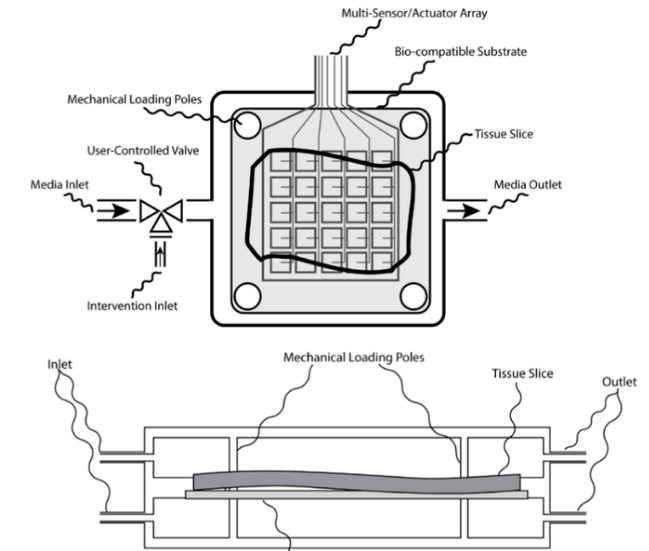Researchers at the George Washington University have invented a novel apparatus and method allowing high-throughput testing of pharmacological agents and therapeutic virus on human tissue (e.g. human cardiac slices). The apparatus can be used to create induced disease models for testing of therapies targeting specific diseases. For example, heart failure can be induced in cardiac slices using chronic beta-adrenergic stimulation. Various functional parameters such as conduction velocity, action potential duration, contractility, and degree of fibrosis can be measured to assess efficacy of different heart failure treatments. Cardiac slices can also be obtained from tissue biopsy, allowing for patient-specific testing in personalized medicine.
Cardiac slices on a chip offer human tissue level functional electrophysiology, high throughput, and long term viability. Translation of novel therapies from bench to bedside is hampered by profound genetics and physiology disparities between animal and human. Established research and therapy development techniques using human tissue occupies two ends of the spectrum. Isolated primary cells are ideal to study individual ion channel currents, but lack of multi-cellularity and intercellular contacts make this model unsuitable for investigation of multi-cellular events such as cell-cell communication, cardiac conduction, and arrhythmia. Additionally, enzymatic dissociation procedure can significantly degrade selected potassium channel function. Coronary perfused intact tissue preparations require intact coronary systems, therefore limiting the number of preparations that can be dissected from a single human heart. Both of these preparations can only be maintained for several hours, which prevent long-term chronic experimental investigation, including gene expression and proliferative responses. Novel models such as induced pluripotent stem cells are promising, but remains unsuitable for clinical research and development due to its immaturity and inability for cells to align. The answer to these problems may be provided by our apparatus - using cardiac slices on a chip, offers human tissue level functional electrophysiology, high throughput, and long term viability.
This technology is a powerful innovation in drug testing, cell and gene therapy, and tissue engineering.

Applications:
- Safety testing of various drugs (for example cardiotoxicity of cancer medications)
- Efficacy and safety of cardio-active drugs
- Gene therapy
- Gene editing (for example, TALENS, CRISPR/Cas9, etc.)
- Cell therapy and tissue engineering
- Implantable bioelectronics (for example soft electronics, biodegradable electronics, etc.)
Advantages:
- Cardiac slices on a chip offer human tissue level functional electrophysiology, high throughput, and long term viability.